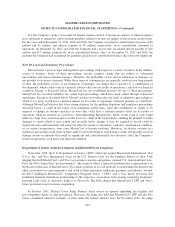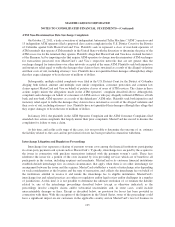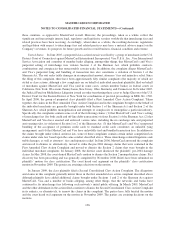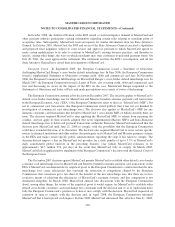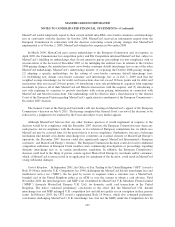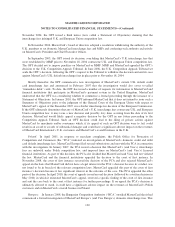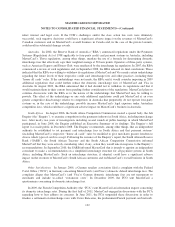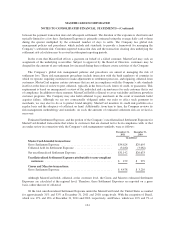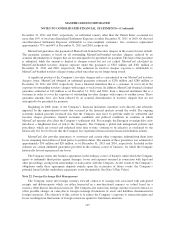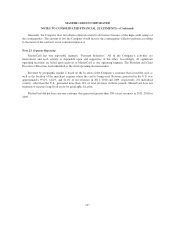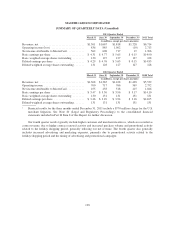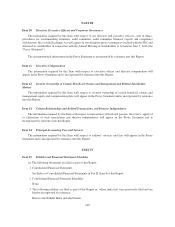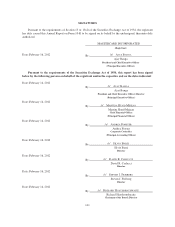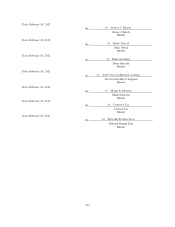MasterCard 2011 Annual Report Download - page 136
Download and view the complete annual report
Please find page 136 of the 2011 MasterCard annual report below. You can navigate through the pages in the report by either clicking on the pages listed below, or by using the keyword search tool below to find specific information within the annual report.MASTERCARD INCORPORATED
NOTES TO CONSOLIDATED FINANCIAL STATEMENTS—(Continued)
relief, interest and legal costs. If the CCB’s challenges and/or the class action law suits were ultimately
successful, such negative decisions could have a significant adverse impact on the revenues of MasterCard’s
Canadian customers and on MasterCard’s overall business in Canada and, in the case of the private lawsuits,
could result in substantial damage awards.
Australia. In 2002, the Reserve Bank of Australia (“RBA”) announced regulations under the Payments
Systems (Regulation) Act of 1998 applicable to four-party credit card payment systems in Australia, including
MasterCard’s. Those regulations, among other things, mandate the use of a formula for determining domestic
interchange fees that effectively caps their weighted average at 50 basis points. Operators of three-party systems,
such as American Express and Diners Club, were unaffected by the interchange fee regulation. In 2007, the RBA
commenced a review of such regulations and, in September 2008, the RBA released its final conclusions. These
indicated that the RBA was willing to withdraw its regulations if MasterCard and Visa made certain undertakings
regarding the future levels of their respective credit card interchange fees and other practices, including their
“honor all cards” rules. If the undertakings were not made, the RBA said it would consider imposing in 2009
additional regulations that could further reduce the domestic interchange fees of MasterCard and Visa in
Australia. In August 2009, the RBA announced that it had decided not to withdraw its regulations and that it
would maintain them in their current form pending further consideration of the regulations. MasterCard plans to
continue discussions with the RBA as to the nature of the undertakings that MasterCard may be willing to
provide. The effect of the undertakings or any such additional regulations could put MasterCard at an even
greater competitive disadvantage relative to competitors in Australia that purportedly do not operate four-party
systems or, in the case of the undertakings, possibly increase MasterCard’s legal exposure under Australian
competition laws, which could have a significant adverse impact on MasterCard’s business in Australia.
South Africa. In August 2006, the South Africa Competition Commission created a special body, the Jali
Enquiry (the “Enquiry”), to examine competition in the payments industry in South Africa, including interchange
fees. After nearly two years of investigation, including several rounds of public hearings in which MasterCard
participated, in June 2008, the Enquiry published an Executive Summary of its findings. The Enquiry’s full
report was made public in December 2008. The Enquiry recommends, among other things, that an independent
authority be established to set payment card interchange fees in South Africa and that payment systems’
(including MasterCard’s) respective “honor all cards” rules be modified to give merchants greater freedom to
choose which types of cards to accept. Following the issuance of the Enquiry’s report, the South African Reserve
Bank (“SARB”), the South African Treasury and the South African Competition Commission informed
MasterCard that they were actively considering what, if any, action they would take in response to the Enquiry’s
recommendations. In September 2010, the SARB informed MasterCard that it intends to appoint an independent
consultant to make a recommendation on a simplified interchange structure for all payment systems in South
Africa, including MasterCard’s. Such an interchange structure, if adopted, could have a significant adverse
impact on the revenues of MasterCard’s South African customers and on MasterCard’s overall business in South
Africa.
Other Jurisdictions. In January 2006, a German retailers association filed a complaint with the Federal
Cartel Office (“FCO”) in Germany concerning MasterCard’s (and Visa’s) domestic default interchange fees. The
complaint alleges that MasterCard’s (and Visa’s) German domestic interchange fees are not transparent to
merchants and include so-called “extraneous costs”. In December 2009, the FCO sent MasterCard a
questionnaire concerning its domestic interchange fees.
In 2009, the French Competition Authority (the “FCA”) sent MasterCard an information request concerning
its domestic interchange rates. During the first half of 2011, MasterCard engaged in discussions with the FCA
regarding how to best address its concerns. In June 2011, the FCA suspended these discussions in order to
finalize a settlement on interchange rates with Cartes Bancaires, the predominant French payment card network.
132


